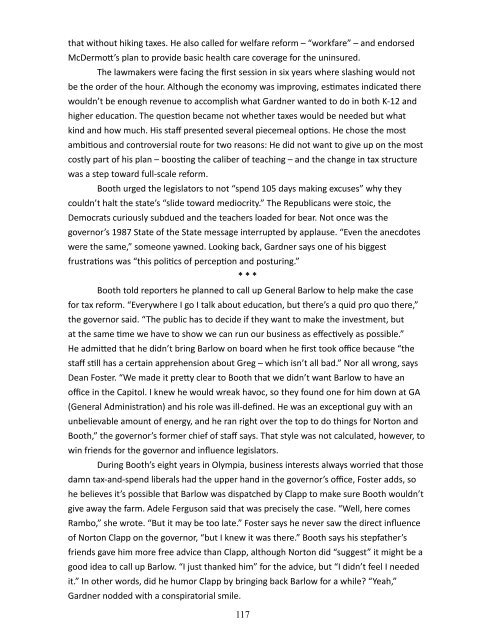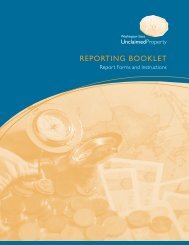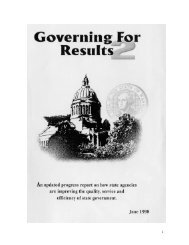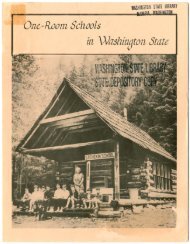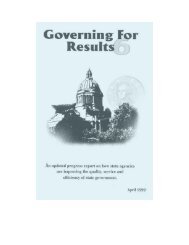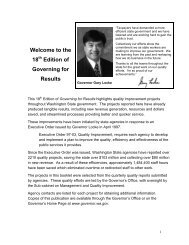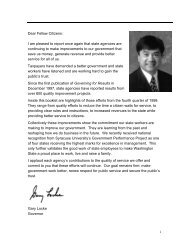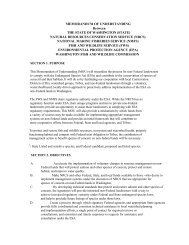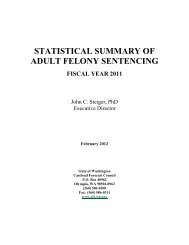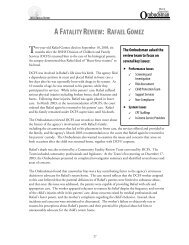BOOTH WHO? - Washington State Digital Archives
BOOTH WHO? - Washington State Digital Archives
BOOTH WHO? - Washington State Digital Archives
Create successful ePaper yourself
Turn your PDF publications into a flip-book with our unique Google optimized e-Paper software.
that without hiking taxes. He also called for welfare reform – “workfare” – and endorsed<br />
McDermott’s plan to provide basic health care coverage for the uninsured.<br />
The lawmakers were facing the first session in six years where slashing would not<br />
be the order of the hour. Although the economy was improving, estimates indicated there<br />
wouldn’t be enough revenue to accomplish what Gardner wanted to do in both K-12 and<br />
higher education. The question became not whether taxes would be needed but what<br />
kind and how much. His staff presented several piecemeal options. He chose the most<br />
ambitious and controversial route for two reasons: He did not want to give up on the most<br />
costly part of his plan – boosting the caliber of teaching – and the change in tax structure<br />
was a step toward full-scale reform.<br />
Booth urged the legislators to not “spend 105 days making excuses” why they<br />
couldn’t halt the state’s “slide toward mediocrity.” The Republicans were stoic, the<br />
Democrats curiously subdued and the teachers loaded for bear. Not once was the<br />
governor’s 1987 <strong>State</strong> of the <strong>State</strong> message interrupted by applause. “Even the anecdotes<br />
were the same,” someone yawned. Looking back, Gardner says one of his biggest<br />
frustrations was “this politics of perception and posturing.”<br />
* * *<br />
Booth told reporters he planned to call up General Barlow to help make the case<br />
for tax reform. “Everywhere I go I talk about education, but there’s a quid pro quo there,”<br />
the governor said. “The public has to decide if they want to make the investment, but<br />
at the same time we have to show we can run our business as effectively as possible.”<br />
He admitted that he didn’t bring Barlow on board when he first took office because “the<br />
staff still has a certain apprehension about Greg – which isn’t all bad.” Nor all wrong, says<br />
Dean Foster. “We made it pretty clear to Booth that we didn’t want Barlow to have an<br />
office in the Capitol. I knew he would wreak havoc, so they found one for him down at GA<br />
(General Administration) and his role was ill-defined. He was an exceptional guy with an<br />
unbelievable amount of energy, and he ran right over the top to do things for Norton and<br />
Booth,” the governor’s former chief of staff says. That style was not calculated, however, to<br />
win friends for the governor and influence legislators.<br />
During Booth’s eight years in Olympia, business interests always worried that those<br />
damn tax-and-spend liberals had the upper hand in the governor’s office, Foster adds, so<br />
he believes it’s possible that Barlow was dispatched by Clapp to make sure Booth wouldn’t<br />
give away the farm. Adele Ferguson said that was precisely the case. “Well, here comes<br />
Rambo,” she wrote. “But it may be too late.” Foster says he never saw the direct influence<br />
of Norton Clapp on the governor, “but I knew it was there.” Booth says his stepfather’s<br />
friends gave him more free advice than Clapp, although Norton did “suggest” it might be a<br />
good idea to call up Barlow. “I just thanked him” for the advice, but “I didn’t feel I needed<br />
it.” In other words, did he humor Clapp by bringing back Barlow for a while? “Yeah,”<br />
Gardner nodded with a conspiratorial smile.<br />
117


